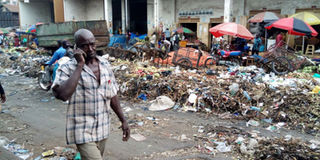Leaders not doing enough for city status, Mbale residents say

A man passes by heaps of garbage in Mbale Central Market. PHOTO BY YAHUDU KITUNZI
Residents of Mbale Municipal Council have criticised their leaders for failure to get rid of garbage in the town as it prepares to become a city, this year.
The locals say the municipal leaders have not only failed in streamlining waste disposal but also mismanaged affairs of the town.
“The stinking waste in the town is causing untold suffering to us but they are not bothered. These are some of the signs that they have failed to manage this town,” Mr Amuza Manana, a boda boda rider at Clock Tower stage, said.
The first five of the 15 cities that the Cabinet approved on Monday will start operations in July 2020, Ministry of Local Government hasconfirmed.
“We have set aside a budget of Shs130 billion to operationalise the cities, with the first lot starting in July 2020,” Col Tom Butime, the former minister of Local Government, said.
Elevations
In May last year, government approved the elevation of 15 municipalities to cities. Initially, the first lot to be implemented this year included Arua, Gulu, Jinja, Fort Portal and Mbarara. In the second cohort, Hoima and Mbale will be elevated in 2021, while Lira and Entebbe would be in the third lot. Others were Nakasongola, Moroto, Masaka, Soroti, Kabale and Wakiso.
However, Mbale and Masaka officials protested the move to delay the implementation until after the General Election in 2021. President Museveni yielded to their demands and they were included in those starting this year. But the municipalities do not seem to be moving in the right direction.
In March 2018, the Director of Value for Money at Office of the Auditor General (OAG), Mr Stephen Kateregga, said towns in Uganda are able to collect only 40 per cent of their garbage whereas 60 per cent either rots on streets or perhaps gets washed away by running water up to wetlands and nearby rivers.
The Mbale Municipal leadership also acknowledge the problem and note that the rate at which residents are generating waste exceeds its capacity to manage it.
Many streets in Mbale, especially Kumi and Market streets, have rubbish littered allover.
When Daily Monitor visited the Mbale Central Market on Friday morning, the market’s upper entrance gate had been turned into garbage dumping site, with stench.
Ms Irene Nafuna, a tomatoes seller, said the heaps of garbage are everywhere in the market.
“We operate in a very filthy environment yet we pay a lot of money to the municipal leaders to keep the market clean,” Ms Nafuna, said.
Mr Kassimu Madagi, the youth Councillor of Mbale Municipality, said corruption is to blame for the malfunctioning of the council.
“Mbale Municipal Council has a number of challenges and garbage is just one of them but all due to rampant corruption,” he said.
“The government is not doing enough to fight corruption and this explains why there is persistent low local revenue collection each financial year despite booming business in town. We only collect about a billion upto now,” he said.
Research
According to a research conducted in 2017 by Twaweza East Africa, a Non-Governmental Organisation (NGO), entitled “Uganda’s view on governance, information and citizen engagement”, eight out of 10 citizens said the government is doing a bad job at controlling corruption, inflation and creating jobs.
“A clear majority of Ugandans (81 per cent) feel the government is not doing a good job of keeping the price of essential goods down. Similar numbers feel the government is not doing well at creating jobs (78 per cent) and fighting corruption (79 per cent),” the report reads in part.
Ms Rhoda Nyaribi, the senior environmental Officer of Mbale Municipal Council, says the garbage problem in the town is getting out of hand.
Leaders
“We have a problem of lack of garbage trucks, which has made the situation worse, but we are trying to keep the town clean,” Ms Nyaribi, said.
Mr Yasin Wabomba Kawanguzi, the deputy Speaker of Mbale Municipla Council, says all municipalities face a garbage problem due to lack of enough funding from central government.
The Mbale Municipal Council Town Clerk, Mr Paul Batanda, however, said garbage collection is a duty of the Division leadership.
“The municipal council doesn’t collect garbage in town. Our role is to manage garbage sites,” Mr Batanda says.
The Principal Assistant Town Clerk of Industrial Division, Mr Robert Wambede, instead blamed residents are littering the town with garbage.
“We sweep the town everyday but after 30 minutes the town is littered with garbage again by vendors and resident,” Mr Wambede said, adding garbage management is expensive.
Requirements for a city
The Local Government Act under Chapter 243 requires that a municipality seeking to gain a city status must have a population of 500,000 inhabitants although government recently revised it to 300,000 since it is hard for most towns to reach a population of 500,000 people currently.
It must also have the capacity to meet the cost of delivering services for the population, a master plan, sufficient water sources and an administrative unit.
According to the 2002 national census, the population of Mbale was about 71,130. In 2010, the Uganda Bureau of Statistics (UBOS) estimated the population at 81,900. In 2011, UBOS estimated the mid-year population at 91,800.[8] In 2014, the national population




